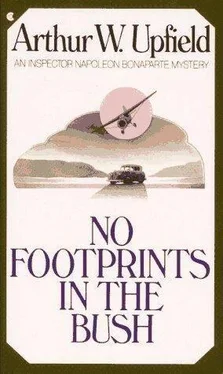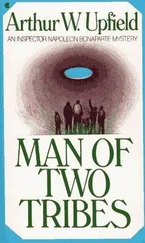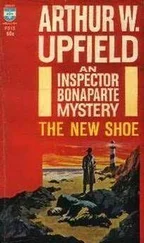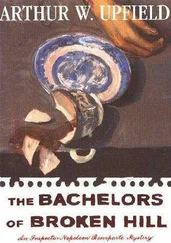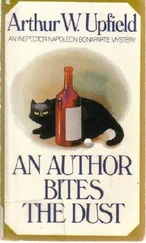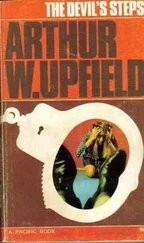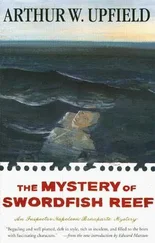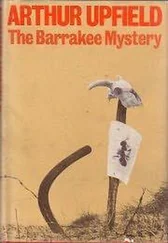Arthur Upfield - No footprints in the bush
Здесь есть возможность читать онлайн «Arthur Upfield - No footprints in the bush» весь текст электронной книги совершенно бесплатно (целиком полную версию без сокращений). В некоторых случаях можно слушать аудио, скачать через торрент в формате fb2 и присутствует краткое содержание. Жанр: Классический детектив, на английском языке. Описание произведения, (предисловие) а так же отзывы посетителей доступны на портале библиотеки ЛибКат.
- Название:No footprints in the bush
- Автор:
- Жанр:
- Год:неизвестен
- ISBN:нет данных
- Рейтинг книги:5 / 5. Голосов: 1
-
Избранное:Добавить в избранное
- Отзывы:
-
Ваша оценка:
- 100
- 1
- 2
- 3
- 4
- 5
No footprints in the bush: краткое содержание, описание и аннотация
Предлагаем к чтению аннотацию, описание, краткое содержание или предисловие (зависит от того, что написал сам автор книги «No footprints in the bush»). Если вы не нашли необходимую информацию о книге — напишите в комментариях, мы постараемся отыскать её.
No footprints in the bush — читать онлайн бесплатно полную книгу (весь текст) целиком
Ниже представлен текст книги, разбитый по страницам. Система сохранения места последней прочитанной страницы, позволяет с удобством читать онлайн бесплатно книгу «No footprints in the bush», без необходимости каждый раз заново искать на чём Вы остановились. Поставьте закладку, и сможете в любой момент перейти на страницу, на которой закончили чтение.
Интервал:
Закладка:
“Constant trouble became rife among the Wantella aborigines, lasting until Burning Water was made chief after his father died. There’s still trouble simmering, because there’s still hostility towards Burning Water and me, kept alive by Rex. I understand from Burning Water, who in turn gets to know things, that Rex has built himself a homestead, has broken down the sectional mode of living of the Illprinka blacks, and has drawn them into one big mob.
“He’s an Ishmael: always was. The final shove that pushed him over the edge was the money my father left him which was taken away by those dishonest trustees. Where he got his vices, I don’t know. I’ve never been really bad, and there was no hint of vice in Tarlalin. But he’s my son, and it’s my place to deal with him. It has been my money and my cattle he’s stolen, but he has stolen other things as well-the lives of Errey and Mit-ji and those two stockmen.
“And now, Inspector, you have come. D’youknow, I’d determined to be my lad’s judge and executioner. I thought it would be best-in fact, I still think so-for all concerned, to take all my bucks and go after Rex and deliver justice. You can, perhaps, now understand why I don’t want you or any other policeman interfering. I’m the last male McPherson, for Rex cannot be counted; the last representative of all those men in the dining-room. It is my duty to obliterate the stain I have created on the honoured name. I have let loose on the world a human devil, a monsterwho has been a torment to me, who had put an awful fear into the heart of a good woman, the agony of grief into the heart of another; and has brought ruin to a tribe of blacks who, no matter how wild, were at least morally decent.”
Abruptly flinging backward his chair, McPherson stood up.
“I’ll see you in the morning,” he shouted. “I can’t stand any more tonight. When you’ve finished with the whisky, turn out the light. You know the way to your room.”
Chapter Eight
Facets
I
WHEN the sun was gliding the tops of the bloodwoods bordering the gully between the land shoulders, Bonaparte was standing on the dam wall, watching the fish jumping for flies. The cement-faced barrier was all of two hundred yards in length, and was at least a hundred feet high from the bed of the gully. Wide enough on the top to permit a wagon to be driven across it, it barred back a reserve of precious water sufficient to defy the worst of droughts. Smoke was rising from the house kitchen, and from the kitchen-dining-room beyond at the men’s quarters. The white-clad figure of the men’s cook appeared from a cane-grass meat house carrying a tray of beef steaks. For a moment Bony turned to gaze out over the golden pavement of the plain to the distant hills, softly blue-grey and mysterious, an inviting picture hiding its hideous tragedy.
Crows cawed and galahs shrieked. Calves bellowed for their yarded mothers, awaiting the milking. And Napoleon Bonaparte began another day’s work by seeking an interview with the men’s cook. Just inside the kitchen doorway he greeted the tall white figure standing before the stove with its back to him.
The cook twisted his body, and then continued to twist his neck until he was able to look back over a narrow shoulder. He was an elderly man, and was engaged in transferring the beef steaks to a large iron grill.
“Good day!” he said, his voice thin and piping. “How’s thingsup your street?”
“Fairly quiet, I think,” he said, finding himself in the usual interior of a kitchen-dining-room. “Have you many to cook for?”
“No-oh, no! Only me and old Jack and half a dozen nigs. I bake the bread and cake for the big house, but thatain’t much. I can do theflamin ’ lotstandin ’ on me head. Itain’t a bad job, as far as it goes. We allhas to work under the ruddy capitalist system, but the timeain’t far off when us workers will break our chains.”
“You think they ever will?” inquired the interested Bony.
“Too right they will,” asserted the cook, and with a crash he tossed the empty tray to a nearby bench. “The day’sgonna come when us slaves will take over the means of production, distribution and consumption, and then there’sgonna be no more unemployment and starvation and wars and things. I tell you-”
“Stow your noise!” commanded a deep and full voice from without. Following the voice, entered the old man whom, late the previous afternoon, Bony had seen attending to the garden. He wore long white side-whiskers like the Emperor Franz Joseph, and when he removed his old felt hat he revealed a cranium completely bare of hair.
“You and your revolutions and slaves and up-and-at-’emworkers,” he scoffed. “Why, you touch your forelock to the boss every time you see him, fearing you’d lose your poisoning job.” Then to Bony: “Good day to you, mister! Has this gallows bird made a drink of tea yet?”
“Well, I was hoping so,” Bony ventured.
“Coo!” snorted the cook. “Can’t you wait for breakfast? Think a man’s a slave to bemakin ’ tea all day and all night?”
“Stow your noise, and let me at the tea billy,” said the ancient, and strode towards the kitchen range whereupon stood a steaming billycan. As he passed Bony, he winked one eye. Taking two bright tin pannikins from a row hanging on wall hooks, he filled them and returned to the table. “Here you are, mister! Help yourself to milk and sugar, and don’t take any notice of our localpoisoner. He’s not too bad.”
Having well laced his tea with milk, he removed the square board, covering a seven-pound jam tin serving as a sugar basin, and proceeded to helphimself to spoonful after spoonful.
“Hey!” cried the cook. “You go easy on the sugar.”
Again the lid closed over one bright eye, whilst the other sparkled at Bony.
“Stow your noise,” again came the command. “First you’re a slave and then you’re not. First youblackguards the boss and then yell because he might go bankrupt. You are the mostcussedestpoisoner I’ve ever come in contact with.”
The cook grabbed a pannikin from the wall, filled it, and stalked to the table. If anything, his mood was a little lighter. He indicated the ancient with a motion of his long head.
“He thinkshisself smart,” he said to Bony, adding directly to the allegedly smart one: “Anyhow how’s things up your street?”
They sat on the form flanking the long table, and the cook began the loading of a black pipe with jet-black tobacco.
“Not too good, Alf,” the old man replied, his bright eyes clouding.“Something’s ’appenedwhat I can’t make out. You know that bed in front wherethem Madam Leroy standards is growing?”
“Yes. Didn’t you show ’emto me that day you swore you’d ask for your cheque if the hoppers cameagain. They come the next week, but you’re still ’ere.”
“That’s the bed,” asserted the old man, triumphantly. “Well, on the grass near that bed, whatd’you think I found?”
“Dunno. Not a quid note, I’ll bet. I’ll bet thereain’t one on theflamin ’ station. What did you find?”
Bony, seeing that he was supposed to ask the same question, asked it.
“I found a dent deep enough to put me hand in.”
“A dent!” exclaimed the cook. “What kind of a dent?”
“Just a dent, Alf, just a dent. And in that dent was a lot of dry sand. Now-you tell me how dry sand got into that dent; and how the dent got into the lawn when last evening there wasn’t no dent, and the lawn was wet from watering and there wasn’t any sand, wet or dry, on the lawn at all.”
“Well, I suppose theflamin ’ windblow’d the sand into that dent, you old fool,” growled the cook.
“Stow your noise!” snarled the ancient, and gulped loudly at his tea. “I tell you there wasn’t no dent there last evening, and no sand, wet or dry, in the dent last evening. What I’m asking you is to tell me how that dent got there.”
Читать дальшеИнтервал:
Закладка:
Похожие книги на «No footprints in the bush»
Представляем Вашему вниманию похожие книги на «No footprints in the bush» списком для выбора. Мы отобрали схожую по названию и смыслу литературу в надежде предоставить читателям больше вариантов отыскать новые, интересные, ещё непрочитанные произведения.
Обсуждение, отзывы о книге «No footprints in the bush» и просто собственные мнения читателей. Оставьте ваши комментарии, напишите, что Вы думаете о произведении, его смысле или главных героях. Укажите что конкретно понравилось, а что нет, и почему Вы так считаете.
